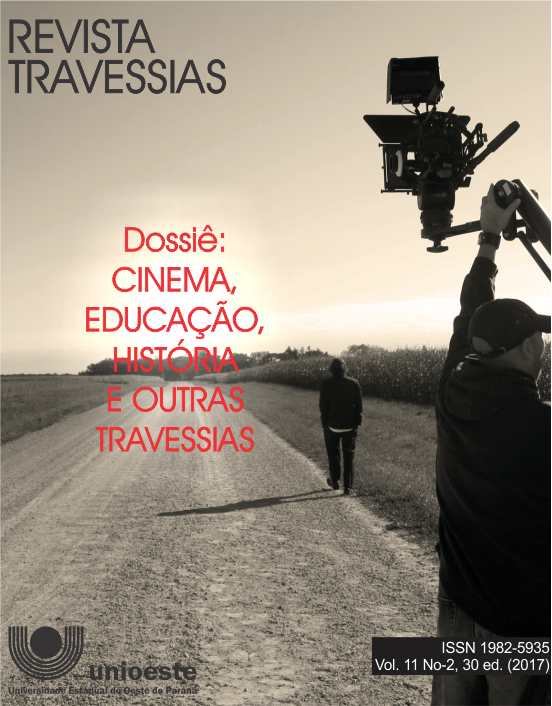The cinematographic language and the poetic expression in the movie Detachment
Keywords:
Cinema, Detachment, Poetry.Abstract
This study presents an analysis of movie Detachment (2012) from the understanding of the effects of the senses promoted by the cinematographic language, which contains elements from the "cinema of poetry", coined by the Italian filmmaker Pier Paolo Pasolini, and which provides for the use of the "subjective indirect free" camera as its main feature. The subject of teaching is recurrent in cinema, but unlike other films, Detachment breaks with the romanticized perspective of the figure of the teacher. In this way, the dramatic intensity of the narrative is associated with the choices of plans and camera movements, construction of space and, above all, time, specific aspects to the seventh art. In this work, the existential conflicts of a teacher indifferent to social bonds and to the profession make the personal drama responsible for the high emotive density of narrative. Based on the analysis of some cinematographic elements, this study sought to analyze how poetry is present in this work and how it contributed to ramify the construction of the senses and present a new form of interpretation to the viewer.Downloads
References
BUÑUEL, Luis. Cinema: instrumento de poesia. In: XAVIER, Ismail. A experiência do cinema: antologia. Rio de Janeiro: Graal, 1983.
DALTON, Mary. The Hollywood curriculum teachers in the movies. 2.nd. edition. Peter Lang: New York, 2010.
DELEUZE, Gilles. L’image-mouvement. Paris: Les Éditions de Minuit, 1983.
FERREIRA, Carlos Mello. As poéticas do cinema. Porto: Edições Afrontamento, 2004.
FISCHER, Ernst. A necessidade da arte. 9.ed. Trad. Leandro Konder. Rio de Janeiro: Ed. Guanabara, 2002.
GRAVELLE, Elizabeth L. Reality check. I am not Hilary Swank: how American teacher-centric commercial films tried and failed to teach me how to be a teacher. Texas Christian University, 2015.
KINSKI, Davi. Pasolini: do Neorrealismo ao cinema de poesia. São Paulo: Laranja Original, 2016.
LOTMAN, Iuri. Estética e Semiótica do Cinema. Lisboa: Estampa, 1978.
MARTIN, Marcel. A linguagem cinematográfica. Trad. Lauro Antonio e Maria Eduarda Colares. Lisboa: Dinalivro, 2005.
MORIN, Edgar. O cinema ou o homem imaginário: ensaios de antropologia. Lisboa. Ed. Moraes,1970.
PASOLINI, Pier P. Empirismo herege. Trad. Miguel Serras Pereira. Lisboa: Assirio e Alvim, 1981.
SAVERGINI, Erika. Índices de um cinema de Poesia: Pier Paolo Pasolini, Luis Buñuel e Krysztof Kieslowski. Belo Horizonte: Editora da UFMG, 2004.
SIJLL, Jennifer Van. Narrativa Cinematográfica: contando histórias com imagens em movimento. São Paulo: Martins Fontes, 2017.
TARKOVSKI, Andrei A. Esculpir o tempo. Tradução Jefferson L. Camargo. 2.ed. São Paulo: Martins Fontes, 1998.
TRIER, James D. Using popular ‘School Films’ to engage student teachers in critical reflection. Annual Meeting of the American Educational Research Association – AERA. New Orleans, LA. April, p. 24-28, 2000.
TURNER, Graeme. Cinema como prática social. São Paulo: Summus, 1997.
DETACHMENT. O substituto. Direção Tony Kaye. Distribuição Tribeca Films. EUA, 2012. 97min.
Downloads
Published
How to Cite
Issue
Section
License
Creative Copyright Notice
Policy for Free Access Journals
Authors who publish in this journal agree to the following terms:
1. Authors keep the copyright and grant the journal the right of first publication, with the work simultaneously licensed under the Creative Commons Attribution License, which allows sharing the trial with acknowledgment of authorship and initial publication in this journal.
2. Authors are authorized to take additional contracts separately, for non-exclusive distribution of the work version, published in this journal (eg publish in institutional repository or as a book chapter), with acknowledgment of authorship and initial publication in this journal.
3. Authors are allowed and encouraged to publish and distribute their work online (eg in institutional repositories or on their personal page) at any point before or during the editorial process, as this can generate productive changes, as well as increase both impact and citation of the published trial (See The Effect of Free Access).
Creative Commons License
This work is licensed under a Creative Commons Attribution–NonCommercial-shareaswell 4.0 International License, which allows you to share, copy, distribute, display, reproduce, completely or part of the work, since there is no commercial purpose, and authors and source are cited.



